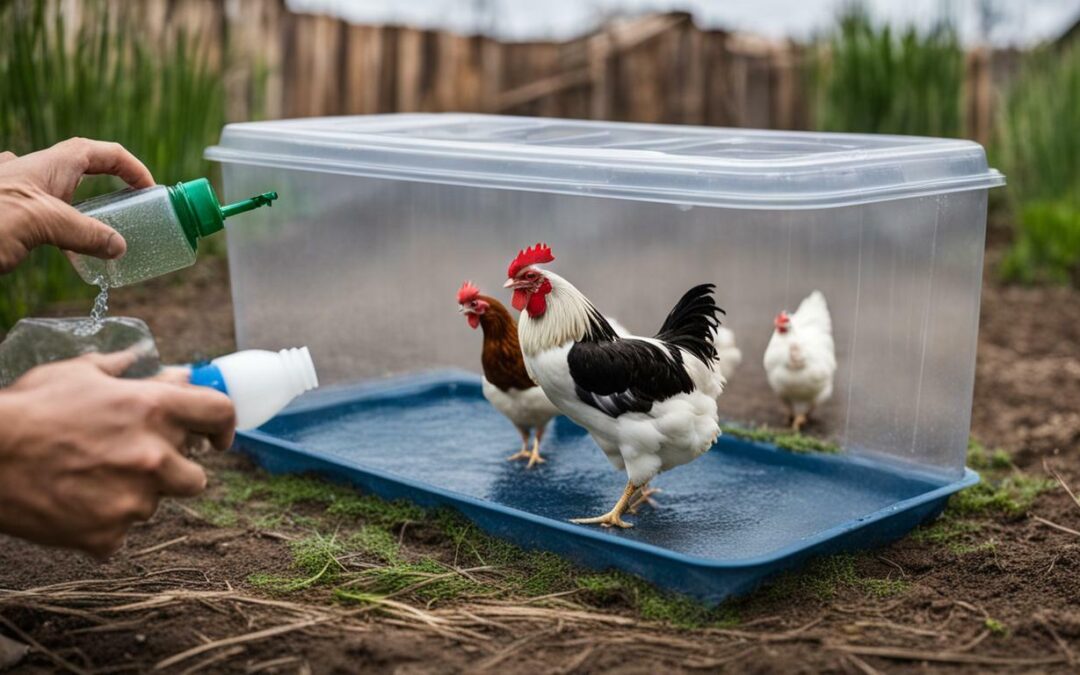Clean water is essential for the health and well-being of your chickens. Maintaining clean poultry water is crucial in preventing dirty water that can lead to bacterial growth and potential health issues for your flock. In this section, we will discuss effective ways to keep your chicken water clean and ensure the overall well-being of your chickens.
Key Takeaways:
- Invest in a purpose-designed poultry waterer to keep fresh water away from contaminants.
- Hang or elevate the waterer to minimize dirt and debris entering the water.
- Clean and refresh the water regularly, ideally once or twice a week, to prevent bacterial buildup.
- Add a small amount of diluted apple cider vinegar (ACV) to the water to reduce bacterial growth.
- Regularly scrub and sanitize the waterer to prevent the accumulation of biofilm.
Investing in a Purpose-Designed Poultry Waterer
One of the best ways to ensure clean chicken water is by investing in a purpose-designed poultry waterer. These specialized waterers are designed to hold fresh water inside a closed compartment, away from contaminants and dirt that may be present in the chicken coop or run. By keeping the water protected, helps minimize the risk of bacterial growth and maintains the cleanliness of the water source for your chickens.
When using a purpose-designed poultry waterer, it is essential to hang or elevate it to prevent dirt and debris from entering the water. By elevating the waterer, you can minimize the amount of dirt that may be kicked up by the chickens or other animals in the coop. This simple step can significantly improve the cleanliness of the water and reduce the risk of contamination.
Regular Cleaning and Refreshing of Water
In addition to investing in a purpose-designed poultry waterer, regular cleaning and refreshing of the water is crucial for maintaining clean water for your chickens. Ideally, the water should be cleaned and refreshed once or twice a week, depending on the number of chickens and the environmental conditions.
By regularly cleaning the waterer, you can prevent the buildup of bacteria and other contaminants that may affect the health of your flock. Empty the water completely, scrub it thoroughly with mild soap or dish detergent, and rinse it well before refilling it with fresh water. This simple maintenance routine can help ensure that your chickens have access to clean and safe water at all times.
Regular Scrubbing and Sanitizing of the Waterer
To ensure clean water for your chickens, it is essential to regularly scrub and sanitize the poultry waterer. Over time, a slimy film of bacteria known as biofilm can accumulate in the water, which can contaminate the water and pose health risks to your flock. Scrub the waterer with a brush and mild soap or dish detergent, paying close attention to any hard-to-reach areas. Rinse thoroughly and sanitize it using a non-toxic poultry-safe disinfectant. By incorporating this practice into your routine maintenance, you can help prevent the transmission of poultry diseases and maintain proper hydration and egg production in your chickens.
Regular Cleaning and Refreshing of Water
Cleaning and refreshing the water regularly is crucial for maintaining clean and fresh water for your chickens. Here are some best practices to ensure the cleanliness of your poultry water:
- Empty and clean the water once or twice a week to prevent the buildup of bacteria. Use a mild detergent and a brush to scrub away any debris or residue.
- Rinse the waterer thoroughly to remove any traces of detergent.
- Refill the water with fresh water, making sure to use clean water from a reliable source. Avoid using water that may contain contaminants or chemicals.
- Position the waterer in a shaded area to minimize exposure to direct sunlight, which can encourage algae growth.
In addition to regular cleaning and refreshing, it’s important to have a backup water source in case something happens to the main water supply. This ensures that your chickens always have access to clean water, even during emergencies or temporary water disruptions.
Preventing Bacterial Growth
Bacteria can multiply in standing water, posing a risk to your flock’s health. To prevent this, add diluted apple cider vinegar (ACV) to the water (1 tbsp per gallon) with natural antimicrobial properties. Regularly clean and sanitize the waterer to prevent biofilm buildup, using poultry waterer-specific cleaning solutions. These practices ensure flock health, optimal hydration, and egg production in chickens.
Using Apple Cider Vinegar (ACV) to Reduce Bacterial Growth
Adding a small amount of diluted apple cider vinegar (ACV) to your chicken water can be an effective way to reduce bacterial growth. ACV has natural antibacterial properties that can help keep the water clean and safe for your flock. Here are some clean chicken water tips on how to use ACV:
- Start by diluting the ACV with water. A ratio of 1 tablespoon of ACV to 1 gallon of water is recommended.
- Pour the diluted ACV into the chicken waterer, making sure to mix it well.
- Regularly monitor the water to ensure that it stays clean and clear. If you notice any signs of contamination, such as a foul odor or floating debris, replace the water immediately.
Using ACV in your chicken water can help maintain water sanitation for backyard chickens. However, it is important to note that ACV should be used in moderation. Too much ACV can disrupt the pH balance of the water and potentially harm your chickens. Therefore, it is crucial to follow the recommended dilution ratio and regularly monitor the water quality.
By incorporating ACV into your chicken water routine, you can provide your flock with a clean water source that helps prevent the growth of harmful bacteria. Remember to also follow other clean water solutions for chickens, such as investing in a purpose-designed poultry waterer and regularly cleaning and sanitizing the waterer to ensure optimal water cleanliness for your feathered friends.
Regular Scrubbing and Sanitizing of the Waterer
To maintain clean chicken water, it is crucial to regularly scrub and sanitize the waterer to prevent the accumulation of biofilm. Biofilm is a slimy film made up of bacteria that can grow in the water over time. If left unchecked, it can lead to water contamination and pose a health risk to your flock.
Here are some steps you can take to ensure that your chicken waterer stays clean and free from biofilm:
- First, disconnect the water from the water source and empty any remaining water.
- Next, use a scrub brush or sponge to clean the inside and outside of the waterer. Pay special attention to any crevices or hard-to-reach areas where biofilm can accumulate.
- After scrubbing, rinse the waterer thoroughly with clean water to remove any residue.
- Once the waterer is clean, sanitize it by using a diluted bleach solution or another poultry-safe disinfectant. Follow the instructions provided by the manufacturer for proper dilution and application.
- After sanitizing, rinse the waterer again with clean water to remove any remaining traces of the disinfectant.
- Finally, allow the waterer to dry completely before refilling it with fresh water.
By following these steps on a regular basis, you can ensure that your chicken waterer remains clean and free from biofilm. This will help to maintain the health and well-being of your flock and prevent the risk of disease transmission through contaminated water.
Conclusion
Clean water plays a vital role in the health and productivity of your chickens, so it is important to implement these steps to keep their water clean and maintain their well-being.
Investing in a purpose-designed poultry waterer is a recommended solution to keep chicken water clean. These waterers are designed to hold fresh water inside a closed compartment, away from contaminants. By hanging or elevating the waterer, you can minimize the amount of dirt that gets into the water, ensuring it remains clean and free from impurities.
Regularly clean and refresh the water once or twice a week to prevent bacterial buildup and maintain chicken health. Adding a small amount of diluted apple cider vinegar (ACV) can reduce bacterial growth but use it sparingly. Scrub and sanitize the chicken waterer regularly to prevent biofilm buildup, ensuring clean, fresh water for healthy chickens, reduced disease risk, and proper hydration and egg production.
In addition to following these steps, it is also a good idea to have a backup water source in case something happens to the main water supply. By being proactive in maintaining clean water for your chickens, you are prioritizing their well-being and setting the foundation for their overall health and productivity.
FAQ
How can I keep chicken water clean?
To keep chicken water clean, it is recommended to invest in a purpose-designed poultry waterer that holds fresh water inside a closed compartment away from contaminants. Hanging or elevating the waterer can help minimize the amount of dirt that gets into the water. It is important to clean and refresh the water regularly, ideally once or twice a week, to prevent the buildup of bacteria. Adding a small amount of diluted apple cider vinegar (ACV) to the water can help reduce bacterial growth. It is also important to have a backup water source in case something happens to the main water supply. Regular cleaning of water containers is important to prevent the transmission of poultry diseases and to maintain proper hydration and egg production in chickens.
Why is it important to use a purpose-designed poultry waterer?
Using a purpose-designed poultry waterer is important because it helps keep the water inside a closed compartment, away from contaminants such as dirt, debris, and droppings. This helps prevent the water from getting dirty and reduces the risk of bacterial growth. Poultry waterers are specifically designed to provide clean and fresh water for chickens, promoting their overall health and well-being.
How often should I clean and refresh the water in the chicken waterer?
It is recommended to clean and refresh the water in the chicken waterer once or twice a week. This helps prevent the buildup of bacteria and ensures that the chickens have access to clean and fresh water. Regular cleaning and refreshing of the waterer help maintain proper hydration and egg production in chickens.
Can I use apple cider vinegar (ACV) to reduce bacterial growth in the chicken water?
Yes, adding a small amount of diluted apple cider vinegar (ACV) to the chicken water can help reduce bacterial growth. ACV has antimicrobial properties that can help inhibit the growth of harmful bacteria. However, it is important to dilute the ACV with water before adding it to the chicken waterer to avoid any potential negative effects on the chickens.
How do I scrub and sanitize the chicken waterer?
To scrub and sanitize the chicken waterer, you can first empty the water and remove any remaining debris. Then, use a brush or sponge to scrub the interior of the waterer with a mild detergent or poultry-friendly disinfectant. Rinse thoroughly with clean water to remove any residue. Allow the waterer to dry completely before refilling it with fresh, clean water. Regularly scrubbing and sanitizing the waterer helps prevent the accumulation of biofilm and ensures clean water for your chickens.

